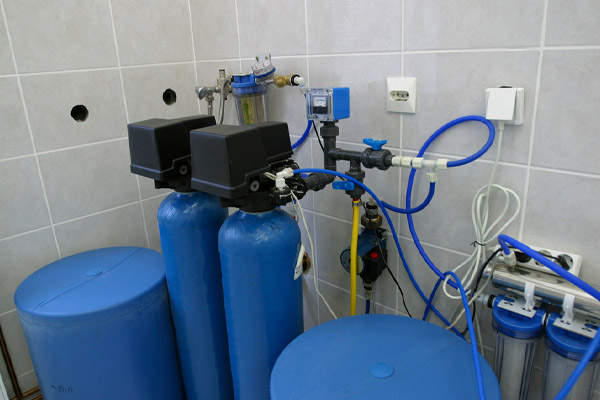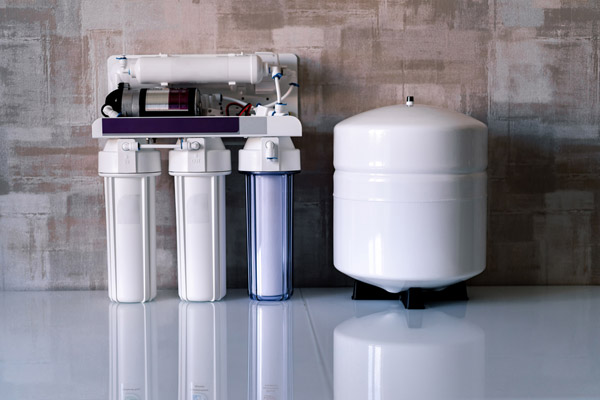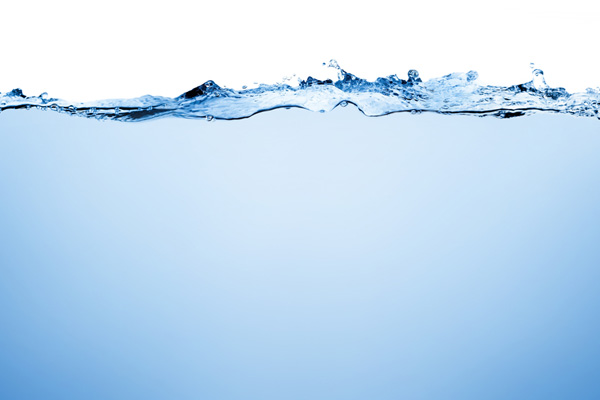Clean water is a fundamental need for a healthy home. It is not only vital for drinking but also for cooking, bathing, and safeguarding your plumbing and appliances. A whole house water filtration addresses the importance of making sure that every water source in your home is free from contaminants. From sediment and chemicals to microorganisms, unfiltered water poses health risks and causes damage to household systems. This discussion will explore the benefits of whole house water filtration systems, their various types, and how they contribute to maintaining a safe and clean water supply throughout your home.
Understanding Water Contaminants
Contents [hide]
- 1 Understanding Water Contaminants
- 2 Whole House Water Filtration Methods Explained
- 3 Science Behind Whole-House Water Filters
- 4 Importance of Professional Whole House Water Filtration Installation
- 5 Benefits of Whole-House Water Filters
- 6 DIY vs. Professional Installation of Whole House Water Filtration
- 7 Future Trends in Water Filtration
- 8 Call Robinson Plumbing For Superior Plumbing Services
Some of the different types of contaminants in tap water include:
- Microorganisms include bacteria, viruses, and parasites like Giardia and Cryptosporidium. If present in water, they can lead to gastrointestinal illnesses.
- Chemicals: Tap water can contain chlorine, chloramines, lead, arsenic, fluoride, and pesticides. Some chemicals are intentionally added for disinfection or dental health, while others can leach from pipes or pollution sources.
- Heavy Metals: Heavy metals like mercury, lead, and cadmium can enter water supplies from corrosion of pipes and industrial processes. Long-term exposure can result in serious health issues.
- Sediments: These are solid particles suspended in water, including sand, silt, and rust. While not typically a health risk, sediments can affect water taste and appearance and cause damage to plumbing.
- Volatile Organic Compounds (VOCs): VOCs like benzene, trichloroethylene, and toluene can come from industrial processes, fuel storage, and more. Prolonged exposure can lead to health problems, including cancer.
Health Risks Associated with Consuming Contaminated Water
Consuming water contaminated with these various pollutants can pose several health risks:
- Gastrointestinal Issues
- Chronic Health Conditions
- Lead Poisoning
- Reproductive and Developmental Issues
- Weakened Immune System
Related Article: Reasons To Install A Whole House Water Filter For Your Home
Whole House Water Filtration Methods Explained
Filtration methods are essential for ensuring the quality and safety of drinking water in homes. There are three common filtration methods used for this purpose.
Activated Carbon Filtration
Activated Carbon Filtration is often found in various water filter systems. It uses porous carbon materials like charcoal to absorb contaminants. These materials have a large surface area with countless tiny pores that attract and hold impurities. These impurities include organic compounds, chlorine, volatile organic compounds (VOCs), and heavy metals. Activated carbon is particularly effective at removing taste and odor from water. It makes the water more palatable and eliminates unpleasant chlorine flavors.
Related Article: Water Filter VS. Water Purifier! Which One To Choose?
Reverse Osmosis (RO)
This is a highly efficient filtration process that removes many impurities. Reverse osmosis systems employ a semi-permeable membrane to separate water molecules from dissolved solids, including minerals, salts, heavy metals, microorganisms, and many chemical compounds. These systems reduce Total Dissolved Solids (TDS) and heavy metals like lead and mercury. However, reverse osmosis systems are often installed as point-of-use systems due to their relatively slow filtration rate and water wastage.
Sediment Filters
Sediment filters are designed to physically remove solid particles suspended in water, such as sand, silt, rust, and debris. These filters use a porous medium to capture particles as water flows through it. While sediment filters primarily improve water clarity by removing visible particles, they are also crucial as pre-filters in whole-house water filtration systems. By capturing larger particles, they protect more sensitive downstream filtration components, such as carbon filters and RO membranes, prolonging their lifespan and effectiveness.
Related Article: Tap Water Smells Like Rotten Eggs: Causes & Solutions
Science Behind Whole-House Water Filters
Whole-house filtration systems are comprehensive water treatment solutions that are installed at the point where water enters your home. They are designed to purify the water distributed to every tap, faucet, and appliance throughout your home. Unlike point-of-use filters that address specific faucets or devices, whole-house systems ensure that the water used for drinking, bathing, cooking, and washing is consistently clean and safe.
The multi-stage filtration process in whole-house systems involves several distinct filtration methods to address various contaminants. It usually starts with a pre-filter, often a sediment filter, which captures larger particles like sediment, sand, and debris to prevent damage to subsequent filtration stages. The water then goes through activated carbon filters, which remove chlorine, volatile organic compounds (VOCs), taste and odor compounds, and certain heavy metals. In some systems, a water softener may be integrated to remove calcium and magnesium ions that cause hard water issues. Additional stages, such as UV (ultraviolet) purification, may be included to disinfect water by deactivating harmful microorganisms. The result is clean, safe, and high-quality water at every tap.
Maintaining water flow and pressure is essential for the effective operation of whole-house filtration systems. These systems are designed with appropriate plumbing and filter sizes to minimize pressure drop and ensure consistent water pressure throughout your home. Regular maintenance, including replacing filters, UV lamps (if applicable), and periodic system checks, is crucial for the system to continue to provide purified water without compromising flow rates.
Related Article: What To Ask When Buying A Home With A Well Water Filtration System
Importance of Professional Whole House Water Filtration Installation
Professional installation of whole-house water filtration systems begins with an expert assessment of your water quality. Trained professionals can conduct water tests to identify specific contaminants and their levels in your water supply. This assessment allows them to tailor the filtration system to your needs.
Proper sizing and customization of the filtration system are vital for optimal performance. Professional installers take into account the water flow rate, pressure, and overall water usage patterns. They select and configure the right combination of filters and treatment methods to handle your water demands while delivering clean and safe water. Customization helps prevent issues like pressure drops and ensures that the system operates efficiently.
Compliance with plumbing codes and standards is another key advantage of professional installation. Licensed plumbers and technicians are well-versed in local plumbing codes and regulations.
Benefits of Whole-House Water Filters
Consistent Quality Water Throughout Your Home
- Enjoy clean, filtered water at every faucet and fixture.
- Enhance your cooking, bathing, and cleaning experiences with water free from impurities.
Protection for Appliances and Plumbing
- Prevent sediment buildup and scale in your appliances and plumbing fixtures.
- Extend the longevity and enhance the efficiency of your appliances, reducing maintenance costs.
Health and Wellness Benefits
- Remove harmful contaminants from your water supply, providing safer drinking and bathing water.
- Reduce your exposure to chlorine and toxins that can have adverse health effects.
Environmental Impact and Sustainability
- Reduce plastic waste associated with bottled water consumption by having clean water at home.
- Decrease energy consumption and carbon footprint.
Convenience and Ease of Maintenance
- Enjoy the convenience of a centralized filtration system that provides clean water throughout your home.
- Schedule professional maintenance for optimal system performance with minimal hassle.
Enhanced Taste and Odor
- Eliminate compounds responsible for unpleasant taste and odor in your water.
- Experience improved drinking water and culinary endeavors with water that tastes and smells better.
Related Article: Why Is Water Quality Important?
DIY vs. Professional Installation of Whole House Water Filtration
Potential Risks and Challenges of DIY Installation
- Inaccurate Assessment
- Improper Sizing
- Plumbing Knowledge
- Code Compliance
Benefits of Professional Installation By a Certified Plumber
- Expert Assessment
- Proper Sizing
- Code Compliance
- Redu
- Warranty Support
- Peace of Mind
Future Trends in Water Filtration
Emerging technologies and innovations in water filtration are poised to revolutionize how we access clean and safe water. Researchers and engineers are actively developing cutting-edge solutions as water quality concerns grow.
- Nanotechnology: one of the frontrunners that enables filtration methods on a nanoscale to target even the tiniest contaminants effectively.
- Advanced Membranes: This includes forward osmosis and ceramic membranes. They are being explored to improve filtration performance.
- Electrochemical Filtration: This process is being developed to target contaminant removal.
- Sustainable Materials: These include biodegradable and renewable options that are gaining traction, aligning filtration systems with environmental sustainability goals.
Integrating smart features and monitoring capabilities is another significant trend in water filtration. Today’s whole-house water filters are becoming smarter, allowing users to control and monitor water quality through mobile apps remotely.
- Smart Sensors: Water filtration systems incorporate sensors to monitor water quality and system performance in real-time. These sensors can detect changes in contaminants and system efficiency.
- Mobile Apps: Users can remotely control and monitor their whole-house water filters remotely via smartphone apps. This allows convenient adjustments and notifications of filter replacement needs.
- Predictive Maintenance: Smart systems can predict when filter replacements or maintenance are required, reducing downtime and ensuring continuous water quality.
- Data Analytics: Water quality data collected by smart systems can be analyzed to provide insights into usage patterns and contaminant trends, helping users make informed decisions.
- Integration with Home Automation: Water filtration systems are being integrated into home automation platforms, allowing users to manage water quality alongside other smart home devices for a seamless experience.
Related Article: Water Conservation Techniques: Water-Saving Home Renovations
Conclusion
Whole-house water filters offer a multitude of benefits, from ensuring consistent water quality throughout your home to safeguarding appliances, enhancing health, and promoting environmental sustainability. To maximize these advantages and guarantee proper system functionality, professional installation by a certified plumber is strongly recommended. We can look forward to even more efficient and convenient water filtration solutions by embracing emerging technologies and smart features. Ultimately, investing in whole-house water filtration is an investment in your home’s health, comfort, and sustainability.
Related Article: How To Know If Your Drinking Water Is Safe
Call Robinson Plumbing For Superior Plumbing Services

Contact Robinson Plumbing, one of the most trusted plumbing companies in the Lehigh Valley, for reliable plumbing services. We offer various plumbing services such as drain clogs, water heater replacements, toilet repairs, water leaks, and more. For any plumbing repairs, we always give a wide range of solutions when possible. This allows you to choose the best options for your home and budget.
Find yourself dealing with an unexpected plumbing problem in the middle of the night? No worries! You can count on the expert plumbers at Robinson Plumbing to take care of you. We offer reliable 24-hour emergency plumbing services. You can count on us to get the job done quickly and correctly and, best of all, at an affordable price.
We proudly offer the most affordable and best plumbing services in the Lehigh Valley area. Our plumbers all have the proper licenses and expertise to ensure your satisfaction. All of our work comes with a guarantee. Contact Robinson Plumbing today and schedule your free estimate.
Call us today at (610) 351-9889 or contact us for any questions that you might have! Click the link to view our service area.




